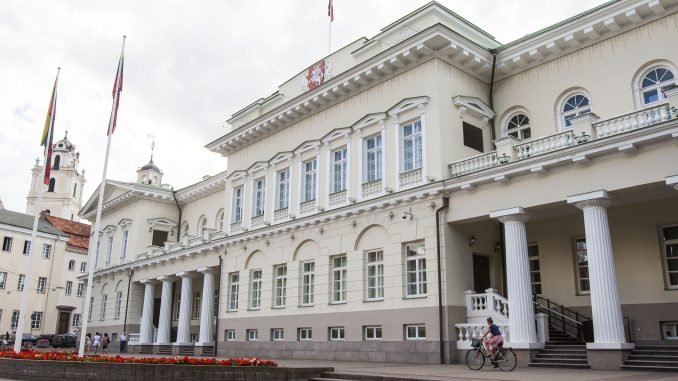
The campaign for the Lithuanian presidential election is slowly gaining momentum, although there are only two publicly announced contenders for the post of Head of State. And they are far from being the first. The earliest announced candidate, A. Veryga, has been joined by the mayor of Kazlų Rūda, M. Varaška, who will run as if on his own but with the support of the Party of Regions, Vytautas Bruveris the Chief Editor of ELTA news agency writes in lrytas.lt.
Many other candidates for the Commander-in-Chief of the Armed Forces will only become more numerous at the end of the year, stubbornly adhering to the old principle – the myth that the later you “enlighten”, the better.
But those we are likely to see in that line-up are already campaigning. Both the undisputed favourite, the incumbent President Nausėda, and the lawyer I. Vėgėlė, as well as, for example, the Member of the Seimas, R.Žemaitaitis, who has been impeached for anti-Semitic statements.
This week, the latter announced a new party that will allegedly take part in all three of next year’s elections, reinforcing fears that their campaign may be even more radical than it seemed before.
However, the campaign for the presidential, European Parliament and Seimas elections remains and seems set to stay, essentially a matter for Lithuania itself, with no particular interest beyond its borders. After all, the same old storms are still in the glass of our domestic politics.
Unless radical elements suddenly gain dizzying momentum and strength, threatening to turn the whole old system upside down.
Or it could turn out that Vėgėlė could oust Nausėda from office. However, the lawyer has not announced anything radical about the country’s foreign policy.
So, all European eyes are now on the Polish and Slovak parliamentary elections. The first will take place in two weeks and the second this weekend.
The elections in Slovakia have also attracted widespread attention because the country’s former Prime Minister, Mr. Fico, and his political force are leading in the polls there, albeit only slightly.
Fico, who has been accused of oligarchic rule, corruption and even political murder, lost power a few years ago and is now burning with the desire for a rematch with his political opponents. He is also returning with a much more radical programme, mainly concerned with fraternisation with Russia and promises to cut off all aid to Ukraine completely.
Many fear that Fico victory would see Slovakia quickly join Hungary, which is on the path of pro-Russian authoritarianism, and Poland, which is openly at war with Brussels or Berlin.
But some call for all alarm bells not to be rung for a country like Slovakia. They reassure us that Fico will not have a solid majority if he wins. Still, above all, he will lead one of the most economically fragile small countries dependent on the European Union for its financial support.
Similar reassuring voices are now being heard in Poland, where there is almost open warfare between the ruling right and the liberal, pro-European opposition. A small gap separates the rivals, and the current government, albeit with a slight lead, is in danger of losing the throne.
This explains Warsaw’s unprecedented conflict with Kyiv or the renewed German offensive. At the same time, it is argued that even if the Polish right remains in power, it will calm down after the elections, and things will return to normal, with support for Ukraine continuing and relations with Brussels or Berlin going down the road of creeping conflict.
The most important context here is that anxiety is building across the EU about the continent’s possible drift first to the radical right and, to a lesser extent, to the extreme left. But in both cases, towards increasing fragmentation, mutual hostility and favouritism towards Russia, leaving Ukraine at its mercy.
These trends are not only observed in the south of the EU, for example, in Spain, but also in the most important EU country, Germany, where the radical right-wing Alternative for Germany continues to grow.
In light of this possible symptomatology, next year’s European elections and their campaign will be observed.
By the way, they will receive much less attention in Lithuania than in the presidential and parliamentary elections simply because they will not be held in conjunction with the second round of presidential elections this year.
But next year’s US presidential election is the most critical and darkest cloud looming over all these troubling developments. The campaign has never really stopped and is raging again with the vigour seen three years ago.
The Republican majority has remained loyal to the former head of state, Mr Trump, and is currently organising the impeachment of the Democratic President, Mr. Biden, in the US Parliament for allegedly opaque support for his son’s business while he was Vice President.
The Democrats are applauding the US law enforcement and the courts for taking Trump to task for allegedly orchestrating the storming of the Houses of Congress and for seeking to change the outcome of the lost presidential election in their favour.
In any case, recent polls show that Mr. Trump has not only caught up with Mr. Biden in popularity but has begun to overtake him.
Therefore, Trump’s return to the White House is a genuine prospect. It is easy to imagine what the return of this figure, who is trying to present himself with an even more radical programme of power grabbing and revenge against everyone, would mean for US relations with the EU and the West.
If Trump were to fail to pull the US entirely out of NATO and relations with the EU in general or to withdraw support for Ukraine altogether, it would still mean nothing less than chaos within the essential Western alliances.
In such a case, Lithuania would undoubtedly be uncertain, and no amount of domestic election results could change the ominousness of the situation.


Be the first to comment